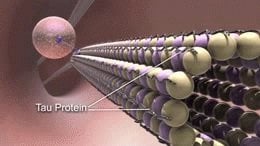People in middle age who have a high blood pressure measure called pulse pressure are more likely to have biomarkers of Alzheimer’s disease in their spinal fluid than those with lower pulse pressure, according to research published in the November 13, 2013, online issue of Neurology, the medical journal of the American Academy of Neurology.
Pulse pressure is the systolic pressure, or the top number in a blood pressure reading, minus the diastolic, or the bottom number. Pulse pressure increases with age and is an index of the aging of the vascular system.
The study involved 177 people ages 55 to 100 with no symptoms of Alzheimer’s disease. Participants had their pulse pressure taken and lumbar punctures to obtain spinal fluid.

The study found that people who have higher pulse pressure are more likely to have the Alzheimer’s biomarkers amyloid beta, or plaques, and p-tau protein, or tangles, in their cerebral spinal fluid than those with lower pulse pressure. For every 10 point rise in pulse pressure, the average level of p-tau protein in the spinal fluid rose by 1.5 picograms per millileter. A picogram is one trillionth of a gram.
“These results suggest that the forces involved in blood circulation may be related to the development of the hallmark Alzheimer’s disease signs that cause loss of brain cells,” said study author Daniel A. Nation, PhD, of the VA San Diego Healthcare System.
The relationship was found in people age 55 to 70, but not in people age 70 to 100.
“This is consistent with findings indicating that high blood pressure in middle age is a better predictor of later problems with memory and thinking skills and loss of brain cells than high blood pressure in old age,” Nation said.
Notes about this Alzheimer’s disease and neurology research
The study was supported by the Alzheimer’s Association, National Institutes of Health, University of Washington and Oregon Health Sciences University.
Contact: Rachel Seroka – American Academy of Neurology
Source: American Academy of Neurology press release
Image Source: The microtubule disintegration image is credited to the US Government and is in the public domain.
Original Research: Abstract for “Pulse pressure is associated with Alzheimer biomarkers in cognitively normal older adults” by Daniel A. Nation, PhD, Steven D. Edland, PhD, Mark W. Bondi, PhD, David P. Salmon, PhD, Lisa Delano-Wood, PhD, Elaine R. Peskind, MD, Joseph F. Quinn, MD and Douglas R. Galasko, MD in Neurology. Published online November 13 2013 doi:10.1212/01.wnl.0000436935.47657.78






